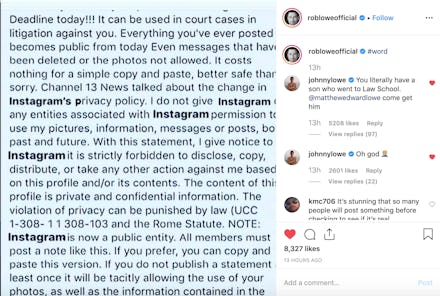Why do celebrities keep falling for this viral Instagram hoax?

“It costs nothing for a simple copy and paste, better safe than sorry.”
In the last 24 hours, a social media hoax so obvious — and so messily patched together it’s like a quilt of phishing scams — went viral on Instagram, spread by a staggering list of celebrities, politicians, and influencers.
The image is a block of text warning of changes to Instagram’s privacy policy. It claims that “as of tomorrow” the platform can seize users’ photos in a Big Brother-esque surveillance ploy. “It can be used in court cases in litigation against you,” the statement reads. “Everything you’ve ever posted becomes public from today [sic] Even messages that have been deleted or the photos not allowed.” Legalese towards the bottom of the message alleges that reposting the text will protect you from the grabby hands of Big Tech, like a magic circle cast by some cyber-witch.
Monica Lewinsky posted it, then deleted it. Rob Lowe posted it and got roasted by one of his sons, who’s a lawyer. Sec. Rick Perry, the politician in charge of our nuclear weapons, also posted it, igniting a barrage of criticism — and at least one commenter offered to introduce the former Texas governor to a Nigerian prince.
The list goes on! Celebrities like Pink, Usher, Retta, Judd Apatow, Julia Roberts, Taraji P. Henson, Josh Brolin, Debra Messing, Julianne Moore, Beyonce’s mom, Wacka Flocka Flame, Carine Roitfeld, Johnny Pigozzi, Giancarlo Giammetti, Lil Kim's stylist, Guy Oseary, and Niall Horan, and a number of influencers all fell for it. And the huge question is why? “There’s no truth to this post,” Stephanie Otway, Instagram’s brand communications manager told WWD.
To anyone who’s used email since 1995, the message is obviously fake. The word “Instagram” has been shoddily copied and pasted atop some other word, probably “Facebook.” It’s bolded and gets bigger as the note goes along. The fact that so many famous and influential people were fooled by such a poorly composed hoax is weird. Is the 1% so sheltered they’ve never been exposed to phishing scams, like the rest of us?
“I think those of us who are steeped in internet culture and paying attention to what happens on social media forget sometimes that not everybody else is as deep into this,” said Irina Raicu, director of the Internet Ethics Program at Santa Clara University. “We all see very different versions of the internet, and most people have other things that they think about more than this.”
The spread of this fake note also highlights how quickly information flows on social media. Jokes about American susceptibility to Russian bots aside, this fairly ridiculous example of somebody punking a bunch of gullible celebrities is a pretty spot-on case study for the spread of fake news. Especially when privacy hoaxes of this sort have made the rounds before — in 2012, 2015, 2016, 2017, and earlier this year.
“What’s getting weaponized now isn’t so much content, as context,” Raicu said, referencing a recent Scientific American article. “You really need the context for something not to be disinformation. Because we don’t take the time and we don’t have the shared reality in order to understand that context, then we’re spreading what ends up being misinformation. Context requires some effort and some time.”
One beautiful thing that’s come of The Scam That Duped a Thousand Influencers is the number of stars taking the opportunity to roast their fellow famous people. Trevor Noah obviously got in on the fun. “Instagram you are a bad boy, don’t use my message for your badness ok!” he wrote. But John Mayer was more of a curve ball, granting Instagram the right to some high quality content, like his world famous meatloaf recipes. (Sec. Perry deleted his original post Wednesday morning, replacing it with a hokey rip-off of Mayer's post.)
Raicu thought this incident highlighted how desperate people are “to take some kind of control over their own quote-unquote content over their own communications. People still feel like if there was something they could do, they would rather err on the side of “maybe this will work,” even if it probably won’t.”
If you take a moment to look up Instagram’s official Terms and Conditions, the company claims, in bold, it does “not claim ownership of your content, but you grant us a license to use it.”
So the joke’s on all of us, I guess? According to Instagram, it already has the right to do whatever it wants with our selfies and meal pics and #tbt posts.
“Most people have no idea what’s in the terms of service, what sorts of rights or licences they’ve granted these companies,” Raicu pointed out. “So when they see something like [the fake note], it seems like a shortcut to regaining some control.” They figure there’s not much to lose, but “if you’re a celebrity, then you get massively scolded by everybody on social media for doing it,” she pointed out.